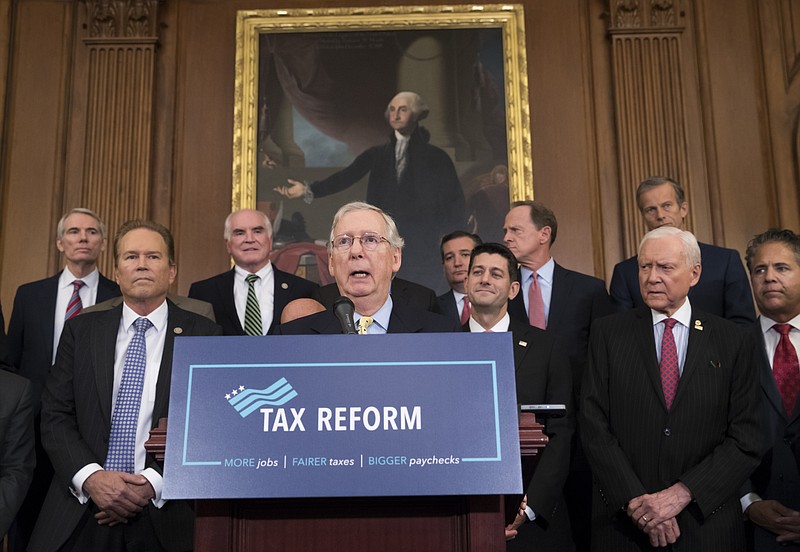WASHINGTON - Of all the follies of 2017, the most tawdry may be the GOP's headlong rush to pass a tax bill that even its proponents don't understand. What's especially sad is that otherwise sensible Republicans seem to be capitulating to the tax-cut frenzy.
Political desperation is the mother of this legislation. Despite Republican control of both houses of Congress, the Trump administration has failed in its first year to enact legislation that deals with major problems, such as health care and immigration. So at year end, we have the spectacle of Trump & Co. bellowing a populist message about lower taxes, even as special-interest lobbyists drive the legislation toward a chaotic conference and final passage.
The tax bill is a Rubik's Cube of potential problems, but the difficulties begin with the fact that it has been pushed through Congress in two months without hearings or careful analysis. The provisions were crafted in secret and passed on party-line votes, without a chance for assessment or analysis.
This haste guarantees confusion later.
The centerpiece of the legislation is a big cut in corporate taxes, down from 35 percent to roughly 20 percent. The theory is that this will encourage companies to invest in job-creating plants and equipment. But there's little evidence to support that assumption. Companies may instead use the windfall to buy back their own stock, boosting stock prices and inflating executives' personal compensation, as Steve Clifford explains in his recent book, "The CEO Pay Machine."
The premise is that by stimulating growth, the tax cuts will pay for themselves. But there's no good evidence for this claim, either. Congress' bookkeeper, the Joint Committee on Taxation, predicts that over 10 years, the tax law would balloon the deficit by roughly $1 trillion, even assuming that it stimulates new growth.
The Treasury Department on Monday offered a one-page rebuttal asserting that Trump administration policies, including the tax cuts, would grow the economy by 2.9 percent over the next 10 years and reduce the deficit by $300 billion. Take a bow, Rosy Scenario.
An analysis by 13 law professors last week warned that the legislation will produce "tax games, roadblocks and glitches" as companies, individuals and state and local governments try to manipulate the new system. "Congress should immediately reconsider its approach," the tax lawyers pleaded.
One of the trickiest games ahead was explained in a research report published Tuesday by Goldman Sachs. The tax bill implicitly punishes high-tax "blue states" by limiting the deductibility of state and local taxes. But Goldman analyst Alec Phillips noted that affected states might "change their own tax systems to reflect the new federal system," by reducing personal income taxes and adding more state-level value-added taxes or property taxes. That could reduce federal revenue.
One more hidden danger: Existing tax law is mildly counter-cyclical (in that tax receipts increase when times are good and decline when they're bad). But the Goldman analyst notes that provisions in the new law "look likely to move the tax code in a more procyclical direction." That's dumb economics.
Robert Crandall, the former CEO of American Airlines and one of the smartest business executives around, described the tax bill last week as "particularly stupid because there is a broad consensus of bipartisan agencies and economists who agree it cannot increase growth by anywhere near enough to offset the revenue losses." He's right.
Responsible Republicans seem to have adopted a fatalistic view that it's too late to clean up this mess. They're wrong. Voters will remember who tried to slow the rush toward passage of this ill-considered legislation and who jumped onto the bandwagon.
Washington Post Writers Group

